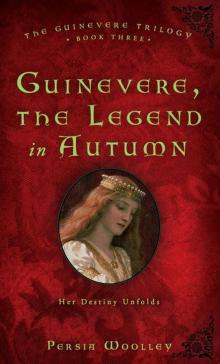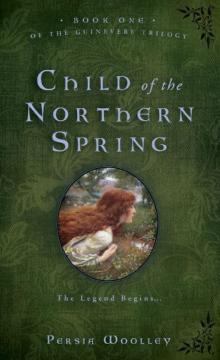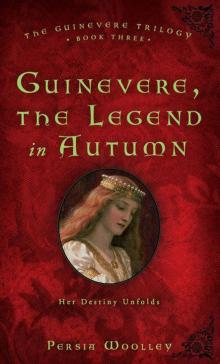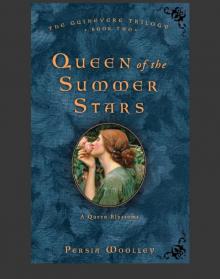- Home
- Persia Woolley
Child of the Northern Spring (Guinevere Trilogy) Page 11
Child of the Northern Spring (Guinevere Trilogy) Read online
Page 11
“What kind of Celtic queen are you going to be if you turn and run at the first challenge?” he teased. “Come on, let’s find out who he is.”
I started to protest, but Kevin grabbed a pine branch and began tickling the sleeper’s balding head.
Halted in the middle of their run, the horses sidled impatiently while the steam rose all around us in the frosty air. Gulldancer, always curious, put his head down and blew cautiously against the stranger’s exposed foot.
“Dear God, defend me,” the raggedy stranger mumbled, trying to swat the pine twitch away even as he drew his legs up under his wolfskin wrap. “All right, all right, I’m getting up,” he added with admirable good nature.
He sat up slowly and rubbed his eyes while we stared in astonishment. A wooden cross hung round his neck, and he made the Christian sign, though it was unclear whether it was a greeting for us or protection for himself. Kevin tossed aside the pine branch.
“Where are you heading, Father?” he asked, taking in the temporary nature of the shelter and the lack of fire site.
“Why, to Whithorn’s monastery, of course,” came the reply.
“How long since you’ve had a full stomach?” my companion asked, and the Pict grinned ruefully.
“It’s not a subject I think on often,” he answered, “for I’ve learned to be satisfied with whatever the Lord provides.”
So we gave him directions to the lake and headed home at a full gallop. The arrival of any visitor is cause for excitement, and one so strange and unusual was bound to be even more interesting.
We left the horses in Rhufon’s care and pelted across the causeway to the house, full of shouts and high spirits.
“Company’s coming…a guest, Gladys, a guest!”
The cook looked up from the pot of porridge she was stirring, her stolid frame registering the barest hint of surprise.
“This time of year?” she questioned, and we told her all we knew while she ladled out portions of the thick, hot oatmeal and put the bowls in front of us.
“Well, he’ll just have to be satisfied with what we’ve got…good strong oats and a dipper of cream.” She shrugged.
“Oh, I’m sure he will be,” Brigit put in, obviously thrilled at the idea of such a visitor. “Holy men don’t look for much, you know.”
So Father Bridei arrived, his ragged clothes and dirty look belying the bright spirit that lit up his eyes. He spent the day with us, and people came from all the other houses, gathering round and asking questions. Even my father joined us that night at the fire to listen to the traveler’s tales of life in the wilds and the monastery at Whithorn, which even boasted a library.
“There are scrolls and tablets and works of all kinds; some with pictures and beautiful covers, and others old and fragile, but all filled with the words of God.”
His face glowed with enthusiasm, and Kevin listened to him intently.
“I’ve a mind to go back there now,” Father Bridei went on, “to live among my fellow monks; my years as a hermit are over for a while.”
“Weren’t you scared,” Kevin asked, “roaming around out there in the forest all alone, without food or fire or anyone to help?”
Our guest smiled, a wise and wonderful look crossing his face.
“’Tis the love of God, and the knowledge that he will protect me from wolf and bear, starvation and the acts of wicked men which makes life beautiful no matter where I am. With the White Christ beside me, I need fear no evil, hoard no gold, desire no luxury. And always, always I return to the monastery with a full heart and praises for my Lord.”
Many in our circle nodded admiringly, impressed by the faith that made this man so brave.
The holy man spent the night with us, and my father gave him permission to say Mass the next morning in one of the outbuildings on the shore. Rhufon muttered about such goings-on, but Brigit and those among the local folk who were also Christian were deeply pleased.
Later, as the monk prepared to continue his journey, everyone crowded round to wish him well. A few asked for a blessing, and he made the sign of the cross over all of us, Pagan and Christian alike.
“Don’t forget,” he called as he turned onto the lakeshore path, “the monastery welcomes any who wish to find shelter in Christ. All you have to do is make your way there.”
Brigit and Kevin and I stood on the causeway, waving with the rest of the household and bathing in the camaraderie the Pictish monk had created. I slid my arms around my companions and gave them a squeeze of love and appreciation.
Surely, I thought, one could not ask for a dearer family, or a more pleasant way of life.
Chapter XII
The Irish Family
It’s been a long day, M’lady,” Arthur’s lieutenant said, nodding a greeting when he reined in beside us. He turned to Brigit. “I figure we should be coming up on the track soon, since we passed the milestone a little while back.”
The Irish girl pointed to a spinney of trees ahead. “That’s the turnoff. And I, for one, will be very glad to get down off this animal and stand on firm ground again!”
We left the Road and after a bit of winding and turning came out on the side of a hill which overlooked Brigit’s family’s steading.
The roundhouses clustered within the protection of a bank and ditch, while beyond them spread fields and barnyards carved out of the wild. A pigsty stood off to one side, and a row of smaller thatched roofs covered the storage pits for grain and other winter provisions. A pair of horses stood prick-eared and curious about our arrival. I wondered if they were the animals my father had given Angus back when the family first came to Rheged.
The track dipped into the trees again and we passed a stand of birches, their “lamb tail” catkins glowing gold in the afternoon light. Traces of sap tapping stained the trunks of several trees, indicating there might be fresh birch wine for our refreshment. Obviously Brigit’s family were using their land well, and it pleased me to think my father had made it possible.
The entire clan was waiting to greet us as we approached the gate. The adults were much as I remembered them, big-boned and redheaded. There were more children now, and one young woman was large with child.
When the greetings and introductions had been made, we all began to file off to the different roundhouses where we would be housed.
“We don’t often have so many guests.” Aunt Oonagh, Kevin’s mother, smiled at me shyly.
“Or such important ones,” put in Brigit’s mother, showing me to the weaving house they had put aside for us. The building was so big that a second circle of posts held up the roof, and box beds had been placed between them and the wall. A half-finished piece waited in the loom beside the door.
“Will you be wanting a rest before dinner?” my hostess asked. “There’s still some little time before it will be ready.”
“Thank you, but I’d rather walk around for a bit. We’ve been in the saddle all day, and my legs could use a stretching,” I answered.
“Ah, sure’n I should have thought of that. Maybe you’d like to have Brigit show you about the place? It’s not exactly a palace, but we’ve done it all ourselves, and it’s home.” The woman fairly glowed with pride.
Lavinia was busy shaking out the dress she expected me to wear that evening, and she looked up now with a scowl. I knew there would be ruffled feathers to soothe where she was concerned, so I thanked Brigit’s mother and told her I’d meet Brigit in the main house in a few minutes. Our hostess left, flushed and happy, and I turned round to face my chaperone.
The little Roman matron stood in the center of the room, as out of place in this rough country house as a fresh-minted coin at the Carlisle fair. Indignation flushed her plump cheeks and crackled in her patrician voice.
“Who ever heard of such a thing? Inviting a girl who’s about to become queen of the whole of Britain to go poke about a farmstead!”
“Now, Vinnie, I think it was very sweet of her. She’s just trying to be hospitabl
e, after all. Why, look at all the trouble they’ve gone to to make us comfortable.”
It was clear the hampers of fleece and bundles of flax that would normally fill the space had been removed, and the house thoroughly aired. Baskets of linen thread and several wooden chests, no doubt filled with woven goods, were stacked under the eaves, and a fresh-filled water pitcher sat in its bowl on top of a cupboard.
“You know you’ll get your pretty dress all splattered with mud and droppings,” Vinnie complained, smoothing the garment tenderly, as though protecting a child.
“Well, as a matter of fact,” I said as tactfully as possible, “I was thinking that it would be better not to wear the dress, since it might get dirty, or even spoiled. In fact, I’d much rather just put on another set of breeches and a tunic, and you can brush these clean and hang them up to air for tomorrow.”
Vinnie was predictably aghast at my suggestion. The good matron still believed that women who rode horseback and wore breeches were an affront to the whole of civilized conduct. She would grudgingly concede that breeches were handy for outdoor activities, but once under a roof she expected me to “remember my station.” Now her pink face registered aggravation and disappointment in equal measure.
“You mean you won’t be wearing the dress either tonight or tomorrow?” she sputtered. “But surely, if you’re going to be riding in the litter a dress would be more fitting.”
We’d reached the nubbin of the problem, and I came over to her and took her hands in mine.
“Vinnie, I’ve been thinking about that too. I’m just not comfortable in the litter: I can’t see where we’re going, or feel the breeze, and its motion makes me sick. It’s a nice idea, and I appreciate your concern, but I’m much happier riding Featherfoot.”
“But the litter was built specially for the occasion,” she reminded me, “copied from the one my grandmother brought from Rome, so that you could come to the High King in style, not straddling some animal in the rags of a barbarian.”
“And I appreciate the trouble you went to. If it will make you happier,” I said quickly, hoping to mollify my governess’ hurt feelings, “I promise to ride in it when we enter Winchester, but until we meet King Arthur, I’ll be much more comfortable wearing my ‘barbarian rags’ and riding with the rest of the party.”
Lavinia kept up a kind of half-scolding as I slipped out of the day’s clothes and into a fresh set.
“And you needn’t think you’ll be getting by with this sort of thing at the High Court!” she concluded as I prepared to go through the door.
I was tempted to say “I know, I know…why do you think I want it so much now?” But I held my tongue and thanked her when she handed me a short cloak with the admonition that it was still nippy out these nights, no matter what the calendar said.
Brigit took me around her family’s farm, and the younger children tagged along, showing off the cows and pigs, and even the flock of greylag geese that came waddling toward us, heads extended and long necks swaying like snakes as they clucked and muttered and hissed their imprecations at us.
The wattle-and-daub buildings were well made, and a squabble of house sparrows filled the upper regions of the barn. The high point of the tour was the kennels, where a litter of pups romped and played, growling and leaping at one another.
“My father’s still proud of his dogs,” Brigit said over the swirl of children that circled round us. “I think he sets more store by them than by his offspring. Certainly he boasts about them more,” she added with a wry smile.
Dusk had fallen by the time we trooped into the main house for dinner. The meal was a gay, noisy affair with members of our escort crowded in among the friends and relatives of Brigit’s family. It was a veritable feast, with roast duck and fresh fish from Morecambe Bay, and a delicious spring pudding of young hawthorn shoots, as well as oat and barley cakes of all kinds.
Angus insisted that I sit in his place at the center of the table, with Bedivere on one side and Brigit on the other. Brigit had offered to help her mother, of course, but had been shooed out of the kitchen with the admonition that this was as much a feast in honor of her as it was for me, so she laughed and plunked down on the bench beside me.
The rest of Arthur’s men were seated randomly about the tables, and all seemed to be enjoying themselves. There was no sign of Merlin, however, and I finally asked Bedivere why the Magician wasn’t with us.
“Do you always keep an eye on everything, M’lady?” His tone was serious, but I saw the same quizzical smile he had given me at lunch.
“Well, uh…” I faltered, not knowing what to say.
“Nay, now, I meant no offense. It’s a good trait is what I’m saying. A queen who thinks only about herself is easy enough to find, but one who is concerned about the welfare and whereabouts of her party is much more to be admired.”
My face went scarlet and I looked hastily down at my plate. Public flattery and compliments for what seemed common sense were not something I was used to, and I felt both foolish and awkward in my reaction.
“I did not mean to embarrass you, Your Highness,” Bedivere added hastily, leaning toward me in order to speak more privately.
When I glanced up, the consternation on his rugged face was so genuine I had to smile.
“Sir Bedivere, I am not used to such flattery. I’m not even used to being called ‘M’lady,’ and who knows how long it will be before I think of myself as a queen? Perhaps our northern ways are considered backward and uncouth by some, but at least they are direct and honest, and not full of…of…” I stumbled to a halt, unable to think of what to say without being insulting.
“What would you rather be called?” he asked, his pleasant manner covering my embarrassment.
“Gwen, I suppose, just as I have been all my life.”
“All right,” he answered solemnly, but the twinkle had not left his eyes. “From now on, in any private conversation, I shall call you Gwen until, or unless, you ask me to stop. Is that better?”
“Much,” I said with relief, feeling as though I had just put Featherfoot over a hazardous jump.
“Now, about the King’s Enchanter…” My companion glanced around the gathering, then shrugged. “Our worthy sage is not fond of crowded rooms and rich food, so he’s probably taken a small repast and retired to a nearby hilltop to eat alone. He is a bit peculiar, you know, but given his age and his importance to The Cause, one can certainly honor his wishes.”
“Ahh,” I said, relieved. “I was afraid that the day’s long ride had overtaxed him. You are sure it is no more than personal preference?”
“Absolutely,” came the response. “I have known him since I was a child, and he’s as durable as they come, for all that he gets out of sorts when forced to travel. Don’t forget, he’s a master of disguise, and while it sometimes suits him to appear as the frail, seedy old man, the Sorcerer inside is still strong and vigorous.”
I laughed. “So I suspected, after our encounter with the Lady’s messenger.” One of Brigit’s sisters was holding a bowl of fresh greens for me, and I took some and thanked her before turning back to Bedivere. “How have you come to have such a long acquaintanceship?”
“Arthur and I were raised in the same household.” He helped himself to the salad and began to spear the tender leaves with enthusiasm. “I was the decoy, I suppose, meant to draw attention away from the other child, should anyone be looking for him. Of course, neither of us knew that at the time. We were just fosterlings, growing up in a small court without any special fuss or attention. Sir Ector treated us the same as he did his own son, Cei, and we might have been three brothers from any Cumbrian kingdom.”
“And Merlin?”
“He was our tutor, more or less. We had no idea then who he was—just an eccentric scholar who found himself in our out-of-the-way corner of Wales. Sometimes a visitor would bring news of the doings at the High Court, and there might be talk of King Uther’s son, hidden by the Magician in some secret
place. But that was all so far removed from our own homespun life, it might as well have been one of the fabulous tales our teacher told about distant lands…it never occurred to any of us boys that we were part of the fable.”
I nodded, remembering Cathbad and his wonderful stories. “Like the Trojan War: something mythical that took place in another world…”
Bedivere grinned. “So your own education has not been all that provincial!” he exclaimed. “How did you learn about the Iliad?”
“From my own tutor, Cathbad the Druid. He introduced it early in our studies. I remember telling my nurse about it that night, while Mama braided my hair, and how astounded Nonny was at the idea that a queen would desert her people just to be with a lover. ‘It maybe all right for some sloppy foreigner, but no Celtic queen would do such a thing!’” I mimicked Nonny’s scorn, and Bedivere laughed. “Up until that moment I suppose I had rather envied Helen, what with being beautiful and sought after by so many men, but from then on I was very glad I was a Celt and not a Greek.”
We ate for a bit in silence before I asked, “How does it feel now, being part of the fable?”
“Well, it took some getting used to, as you can imagine.”
I nodded emphatically, and he smiled again. “Yes, perhaps you’re going through the same sort of thing. But truly, Gwen, once the shock and the first confusion wear off, it’s much the same as it was before. One still gets up in the morning and gets dressed; the day’s plans have to be gone over and then put into action; the dinner is still served at dusk, and the harp still needs to be tuned before one can sing. There’s nothing particularly magical about the things we are doing. But The Cause for which they are done is very splendid indeed. That part of it never ceases to amaze me.”

 Queen of the Summer Stars: Book Two of the Guinevere Trilogy
Queen of the Summer Stars: Book Two of the Guinevere Trilogy Guinevere, the Legend in Autumn: Book Three of the Guinevere Trilogy
Guinevere, the Legend in Autumn: Book Three of the Guinevere Trilogy Child of the Northern Spring (Guinevere Trilogy)
Child of the Northern Spring (Guinevere Trilogy) Guinevere: The Legend in Autumn
Guinevere: The Legend in Autumn Queen of the Summer Stars
Queen of the Summer Stars